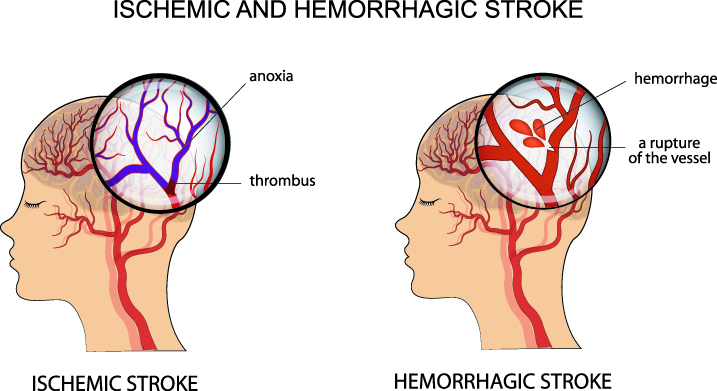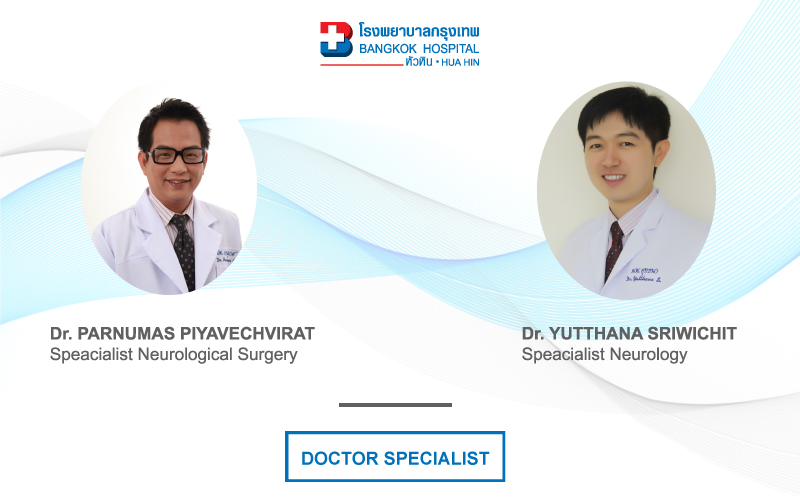How to spot A STROKE – Go to hospital F.A.S.T
The Bangkok Hospital Hun Hin has begun a campaign to make sure everyone understand the signs, dangers and treatment options for stroke. What’s the main message? We asked to three resident neurology specialists that question and the answer was unanimous. “Time is important get to hospital as soon as you possibly can”
When dealing with stroke acting F.A.S.T. is key to treatment and recovery. This is the main platform of the Stroke Campaign; understanding the signs of a stroke and seeking early intervention.
‘Saving your brain’ depends upon reducing every moment that it is deprived of oxygen
F: Face : is the smile one side droopy?
A: Arms: RAISE BOTH ARMS is one side weak?
S: Speech: SPEAK A SIMPLE SENTENCE is it slurred or unable to?
T: TIME : Loss of time could be loss of brain
What Is Stroke
Stroke is a rapid loss of brain functions caused by a reduction in blood flow to the brain, often caused by either blocked blood vessels to the brain or a ruptured blood vessel within the brain itself.
 There are two main types of stroke
Ischemic strokes happen when something blocks an artery that carries blood to the brain. There are several possible causes:
There are two main types of stroke
Ischemic strokes happen when something blocks an artery that carries blood to the brain. There are several possible causes:
 What Are The Treatment Options?
What Are The Treatment Options?
 Bangkok Hospital Hua Hin Stroke Response Team
The mainstays of the neurology team at the Bangkok Hospital are Dr. Yutthana Sriwichit (neurologist ) and Dr. Parnamus Piyavecchvirat ( neurosurgeon). By saying ‘mainstay’ we know that, apart from these specialist doctors and nursing staff, the training of all Bangkok Hospital staff to understand the symptoms and the need for rapid responses is a priority of the hospital. This includes reception staff and everyone who may first come across someone experiencing a stroke.
The doctors are on stand-by onsite in the hospital and are available 24 hour / 7 day. The hospital can also arrange rapid transfer (including by air) to Bangkok facilities in critical cases when more sub-specialists and higher facilities are required.
The emergency line is 1719 or 032-616-888 to ensure a rapid response. An ambulance is likely to be dispatched almost immediately where treatments can be started even before arriving at the hospital. There is even a service to provide communications in your language so that your call will be understood.
Our thanks to the ‘brain doctors’ of Bangkok Hospital Hua Hin for their hospitality, time and insights into Stroke! Having a Stroke may be a scary event, but knowing that ‘best practice’ is available in Hua Hin should provide all the confidence you need.
Brain and Neurovascular Clinic, Bangkok Hospital Hua Hin Tel: 032-616-880
Emergency Tel: 032-616-888
Bangkok Hospital Hua Hin Stroke Response Team
The mainstays of the neurology team at the Bangkok Hospital are Dr. Yutthana Sriwichit (neurologist ) and Dr. Parnamus Piyavecchvirat ( neurosurgeon). By saying ‘mainstay’ we know that, apart from these specialist doctors and nursing staff, the training of all Bangkok Hospital staff to understand the symptoms and the need for rapid responses is a priority of the hospital. This includes reception staff and everyone who may first come across someone experiencing a stroke.
The doctors are on stand-by onsite in the hospital and are available 24 hour / 7 day. The hospital can also arrange rapid transfer (including by air) to Bangkok facilities in critical cases when more sub-specialists and higher facilities are required.
The emergency line is 1719 or 032-616-888 to ensure a rapid response. An ambulance is likely to be dispatched almost immediately where treatments can be started even before arriving at the hospital. There is even a service to provide communications in your language so that your call will be understood.
Our thanks to the ‘brain doctors’ of Bangkok Hospital Hua Hin for their hospitality, time and insights into Stroke! Having a Stroke may be a scary event, but knowing that ‘best practice’ is available in Hua Hin should provide all the confidence you need.
Brain and Neurovascular Clinic, Bangkok Hospital Hua Hin Tel: 032-616-880
Emergency Tel: 032-616-888
 There are two main types of stroke
Ischemic strokes happen when something blocks an artery that carries blood to the brain. There are several possible causes:
There are two main types of stroke
Ischemic strokes happen when something blocks an artery that carries blood to the brain. There are several possible causes:
- A blood clot forms in a main artery to the brain
- A blood clot, air bubble or fat globule forms in a blood vessel and is carried to the brain
- There is a blockage in the tiny blood vessels deep inside the brain
- High Blood Pressure
- Atrial Fibrillation-Irregular heart beat
- High Cholesterol
- Diabetes
- Atherosclerosis-Thickening and hardening of the arteries
- Circulation Problems
- Tobacco Use and Smoking
- Alcohol Use
- Physical Inactivity
- Obesity
- Age
- Gender
- Race
- Family History
- Previous Stroke or TIA (a transient ischemic attack, also called a mini-stroke).
- Fibromuscular Dysplasia-Narrowing of the arteries
- Patent Foramen Ovale (PFO or Hole in the heart).
 What Are The Treatment Options?
What Are The Treatment Options?
- If the stroke is caused by a blood clot, a clot-busting drug may be given to dissolve the clot.
- To be effective, this treatment must be started within 3 to 4 1/2 hours of from the moment the symptoms start. Other given treatments in the hospital will depend on the cause of the stroke. These may include blood thinners such as heparin, warfarin (Coumadin), aspirin, or clopidogrel (Plavix)
- Medicine to control symptoms such as high blood pressure
- Special procedures or surgery to relieve symptoms or prevent more stroke
- Nutrients and fluids
- Physical therapy, occupational therapy, speech therapy, and swallowing therapy will all begin in the hospital.
 Bangkok Hospital Hua Hin Stroke Response Team
The mainstays of the neurology team at the Bangkok Hospital are Dr. Yutthana Sriwichit (neurologist ) and Dr. Parnamus Piyavecchvirat ( neurosurgeon). By saying ‘mainstay’ we know that, apart from these specialist doctors and nursing staff, the training of all Bangkok Hospital staff to understand the symptoms and the need for rapid responses is a priority of the hospital. This includes reception staff and everyone who may first come across someone experiencing a stroke.
The doctors are on stand-by onsite in the hospital and are available 24 hour / 7 day. The hospital can also arrange rapid transfer (including by air) to Bangkok facilities in critical cases when more sub-specialists and higher facilities are required.
The emergency line is 1719 or 032-616-888 to ensure a rapid response. An ambulance is likely to be dispatched almost immediately where treatments can be started even before arriving at the hospital. There is even a service to provide communications in your language so that your call will be understood.
Our thanks to the ‘brain doctors’ of Bangkok Hospital Hua Hin for their hospitality, time and insights into Stroke! Having a Stroke may be a scary event, but knowing that ‘best practice’ is available in Hua Hin should provide all the confidence you need.
Brain and Neurovascular Clinic, Bangkok Hospital Hua Hin Tel: 032-616-880
Emergency Tel: 032-616-888
Bangkok Hospital Hua Hin Stroke Response Team
The mainstays of the neurology team at the Bangkok Hospital are Dr. Yutthana Sriwichit (neurologist ) and Dr. Parnamus Piyavecchvirat ( neurosurgeon). By saying ‘mainstay’ we know that, apart from these specialist doctors and nursing staff, the training of all Bangkok Hospital staff to understand the symptoms and the need for rapid responses is a priority of the hospital. This includes reception staff and everyone who may first come across someone experiencing a stroke.
The doctors are on stand-by onsite in the hospital and are available 24 hour / 7 day. The hospital can also arrange rapid transfer (including by air) to Bangkok facilities in critical cases when more sub-specialists and higher facilities are required.
The emergency line is 1719 or 032-616-888 to ensure a rapid response. An ambulance is likely to be dispatched almost immediately where treatments can be started even before arriving at the hospital. There is even a service to provide communications in your language so that your call will be understood.
Our thanks to the ‘brain doctors’ of Bangkok Hospital Hua Hin for their hospitality, time and insights into Stroke! Having a Stroke may be a scary event, but knowing that ‘best practice’ is available in Hua Hin should provide all the confidence you need.
Brain and Neurovascular Clinic, Bangkok Hospital Hua Hin Tel: 032-616-880
Emergency Tel: 032-616-888